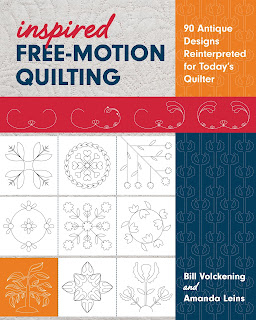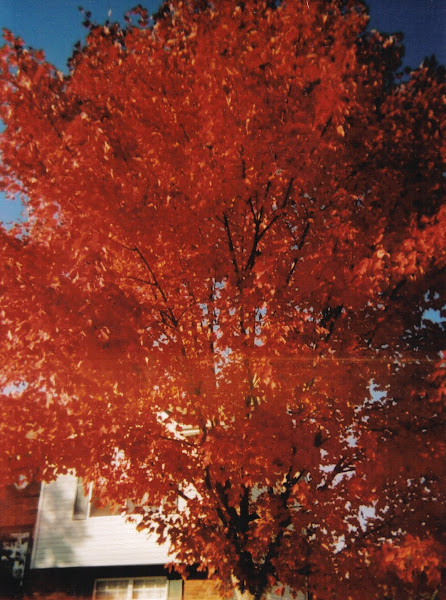Bill Volckening and Amanda Leins have joined forces to bring us a quilting book full of antique quilt eye candy! As an antique quilt student and avid hand quilter, these quilts and designs overwhelmed me with their beauty and creativity. Bill I have been following for a few years now and he provided the gorgeous quilts from his collection. Mandy is a newer name to me and I am so intrigued!! A history in archaeology......Wow! She brings her long arm quilting expertise to the design recreation process all the while making us feel how easy it is to do.
The first thing that greets you when you open the book is a Fantastic Pictorial Table of Contents. Admittedly I don't buy a lot of books but I don't believe I have ever had a visual contents page before and I felt that was clever for dealing with a visual medium audience.
The book offers thought provoking moments like sometimes less is more.
Mandy, “I’ve been so immersed in these
quilts, it would be unusual if I wasn’t affected,”
she says. Mandy has noticed particularly that her
quilting work has become less dense over time and
now incorporates many elements of design from the
top itself—piecing, appliqué, and prints—to create a
cohesive design that works to enhance the top.
This type of less-is-more quilting has a different set
of issues than very dense quilting."
Then she explains what is meant by this.
That resonated with me because I have felt this way for some time and use it as an approach in my own commission work and my workshop, "Fabric Collaborations".
Mandy offers great marking tips and the big take away for me is a stencil grid that is a base for marking designs. Great idea!
Each antique quilt is discussed with detail pics of the amazing quilting all done by hand of course:) Even if there wasn't a picture, you would be able to see it via the wonderfully descriptive writing. So you get a bit of history (some ca 1790) before the designs from those quilts are broken down into accessible bites for the home quilter to recreate in their own works of art!
The book offers thought provoking moments like sometimes less is more.
Mandy, “I’ve been so immersed in these
quilts, it would be unusual if I wasn’t affected,”
she says. Mandy has noticed particularly that her
quilting work has become less dense over time and
now incorporates many elements of design from the
top itself—piecing, appliqué, and prints—to create a
cohesive design that works to enhance the top.
This type of less-is-more quilting has a different set
of issues than very dense quilting."
Then she explains what is meant by this.
That resonated with me because I have felt this way for some time and use it as an approach in my own commission work and my workshop, "Fabric Collaborations".
Mandy offers great marking tips and the big take away for me is a stencil grid that is a base for marking designs. Great idea!
Each antique quilt is discussed with detail pics of the amazing quilting all done by hand of course:) Even if there wasn't a picture, you would be able to see it via the wonderfully descriptive writing. So you get a bit of history (some ca 1790) before the designs from those quilts are broken down into accessible bites for the home quilter to recreate in their own works of art!
FULL QUILT
QUILT DETAIL SHOWING ORANGE PEEL QUILTING
My goal with this post is to show you how to go beyond the idea of quilting alone. ANY outline design is perfectly set for applique and embroidery as well. I hate limits:) Can you tell?
The first one that struck me was this Orange Peel design. For awhile now I have been looking for a cute clock to put in my workspace and when I saw this, I immediately thought, "clock"!! Very exciting. Thankfully I already had some bias vine done and in the right lengths:)
I traced out my circle and peel lines and started adding bias tape. These were then hand appliqued in place.
I then added applique petals just as the design shows in needle turn applique but you could just as easily fuse it all.
It was done in 2 parts, a back petal that encompassed the side petals and a center petal that I fussy cut so that the noon tulip was straight and the other 3 bend counter clockwise.
Then I had to decide whether more marks were needed to represent 1,2,4,5, etc. I decided yes but not in applique so I found a lovely deep orange variegated machine quilting thread from YLI and used it to hand embroider the single petal in those places. It is visible but very subtle so that the applique is the star!
Since there are only so many hours in a day, I had to stop with this Thistle even though I could have designed for hours!
This design is from an antique applique
quilt but I thought it would be lovely in embroidery.
I have a wonderful selection of
Weeks Dye Works variegated flosses.
I chose to make it a bit smaller and trace it out 4 up on a block. This too may be a clock as a gift because
I couldn't make a decision:)
It may also make a small decorative pillow.
The book is laid out for visual people. You have a lovely photo of an antique element and then Mandy walks you through step by step how to make it your own or combine it with other elements.
It was exactly what I was hoping it would be!
I will leave you with this lovely quote by Mandy:
“We never cut our threads to the past,” says Mandy. “We just knot on and continue with a different color".
I hope you will visit the other participants to see how they are being inspired.
Their blog links are found below. There are giveaways too:)
For my giveaway, please leave a comment about your favorite part of the entire quilting process from choosing fabrics to binding and everything in between. Make sure your contact information is available.
On January 14th I will draw a winner and announce it here and on my FB page. The winner from my day will receive a FREE EBook from C&T Publishing. Mandy will also have an additional giveaway on her day (the last one:).
Keep quilting!
January 8: Amanda Murphy of Amanda Murphy Design, Kim Lapacek of http://www.kimlapacek.com/
and Stephanie Palmer of The Quilter's Planner
and Stephanie Palmer of The Quilter's Planner













